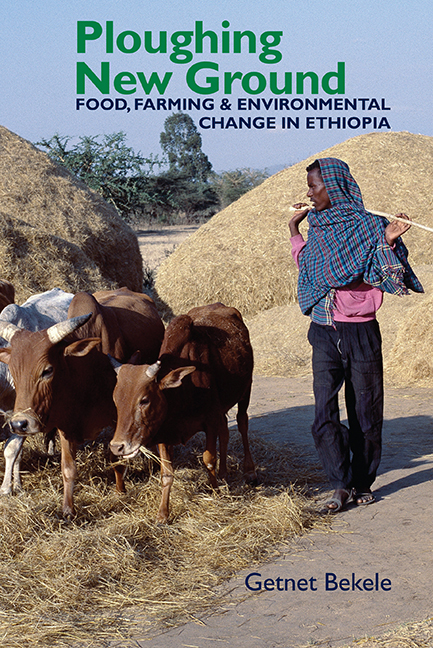Book contents
- Frontmatter
- Dedication
- Contents
- List of Maps and Tables
- Acknowledgements
- Note on Orthography
- Acronyms & Abbreviations
- Glossary
- Map
- Introduction
- 1 Landscape Pastoral: The making and remaking of a grassland environment, 1886–1916
- 2 Negotiating a Landscape: Continuity and change in a grassland environment, 1917–1941
- 3 Blurring the Boundaries: The ascendancy of crop production in a flexible environment, 1942–1955
- 4 Fresh Encounters and Morphing Strategies: The changing organization of production in an era of agricultural intervention, 1956–1965
- 5 Inputs, Outputs and the Farm: Transformations in the science, politics and praxis of agricultural development, 1966–1974
- 6 Competition and Co–existence: Creating space for small- to large-scale farming, 1966-1974
- 7 Of Production and Production Relations: Farming in an era of revolutionary change and socialist development, 1975–1991
- 8 Vicious Circle: Agricultural development at the time of ‘revolutionary democracy’, 1991–2016
- Conclusion
- Bibliography
- Index
- Eastern African Studies
- Frontmatter
- Dedication
- Contents
- List of Maps and Tables
- Acknowledgements
- Note on Orthography
- Acronyms & Abbreviations
- Glossary
- Map
- Introduction
- 1 Landscape Pastoral: The making and remaking of a grassland environment, 1886–1916
- 2 Negotiating a Landscape: Continuity and change in a grassland environment, 1917–1941
- 3 Blurring the Boundaries: The ascendancy of crop production in a flexible environment, 1942–1955
- 4 Fresh Encounters and Morphing Strategies: The changing organization of production in an era of agricultural intervention, 1956–1965
- 5 Inputs, Outputs and the Farm: Transformations in the science, politics and praxis of agricultural development, 1966–1974
- 6 Competition and Co–existence: Creating space for small- to large-scale farming, 1966-1974
- 7 Of Production and Production Relations: Farming in an era of revolutionary change and socialist development, 1975–1991
- 8 Vicious Circle: Agricultural development at the time of ‘revolutionary democracy’, 1991–2016
- Conclusion
- Bibliography
- Index
- Eastern African Studies
Summary
As I was revising this conclusion, news broke out in Ethiopia attesting the ‘suspension of the issuance of new licenses’ in land lease for largescale commercial farming. Already by then the Ethiopian state had leased out, at a deliberately deflated price of on average $0.90/hectare, over 2.43 million hectares of farming land to a total of 5,700 domestic and foreign firms. If that rate tended to suggest the feasibility and efficacy of the government's decade-old policy on large-scale land transfers for commercial farming, many of its clientele had nonetheless difficulty in ‘developing’ and utilizing most of the acquired properties for productive purposes in a prompt manner. From the same source, it is clear that these firms were able to bring under cultivation only a fraction (estimated between 15 and 30 per cent) of the leased land. Interestingly, that was the discrepancy that the Ethiopian state used as rationale, when it made the decision to halt the ‘issuance of new licenses in land lease’ for commercial farming effective 25 March 2016.
To its critics and opponents, this was only the second time that the ruling Ethiopian Peoples’ Revolutionary Democratic Front (EPRDF) was able to heed to popular demand and to reverse course on such a major policy matter since coming to power in May 1991. The first instance, they argue, can be found in the administration's willingness to scrap the newly adopted master plan for Addis Ababa in December 2015. As the available evidence suggests, one of the master plan's primary objectives was to significantly expand the city's boundaries in all directions. This was a controversial move because as a veritable exercise in land grabbing the master plan has tended to jeopardize and undermine the rights and livelihood practices of the smallholder farmers inhabiting the targeted territories. Politically as well, the master plan's adoption revealed the tensions and contradictions that had existed in Ethiopia's ethnically subsumed federal structure. If that was the arrangement that had kept Addis Ababa under the jurisdiction of the federal state, administering the territories that the proposed master plan had sought to appropriate for that city was the exclusive prerogative of the ostensibly autonomous regional state called Oromia. When seen from that angle, what that master plan had sought to accomplish in these territories amounted to a direct infringement and violation of state rights.
- Type
- Chapter
- Information
- Ploughing New GroundFood, Farming & Environmental Change in Ethiopia, pp. 174 - 179Publisher: Boydell & BrewerPrint publication year: 2017



